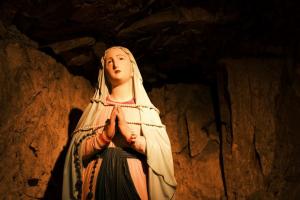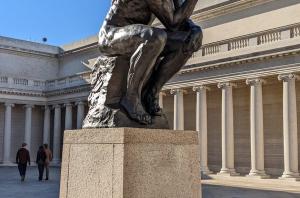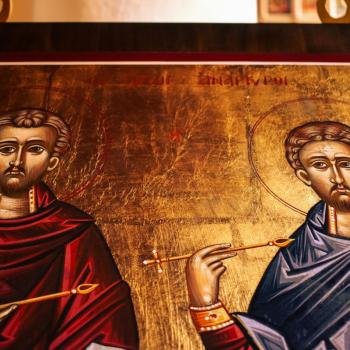In Honor of Pondering Lives

Everyone has seen at least a depiction of The Thinker – a bronze sculpture by Auguste Rodin. The work depicts a nude male figure of heroic size sitting on a rock. He is seen leaning over, his right elbow placed on his left thigh, holding the weight of his chin on the back of his right hand. The pose is one of deep thought and contemplation, and the statue is often used as an image to represent philosophy.

Photo credit Vivian Gomes
I contend that Mary should be the subject of “The Thinker.” Imagine a bronze sculpture of a nude woman sitting on a rock as she ponders, well, everything. Would our confused sexual minds be able to see a woman as the powerful thinker of the universe or would we be trapped in sexual assumptions?
I recommend that my preaching students, when they graduate from seminary, and become pastors, develop a study contract with the congregation. As a pastor, you are responsible for the intellectual development of your congregation. The primary way that you accomplish this vital task is through reading and sharing the results of your reading in your sermons. Stanley Hauerwas puts it exactly right for me: “The reading habits you have developed during your studies are habits crucial for sustaining your life in the ministry. I am sure you have read many good books in seminary, but that reading is meant to prepare you to spend a life reading. You must continue to read and study even though you may receive little reward for doing so. You must, moreover, help the people you serve recognize that their support of your study is a good the whole people of God have in common.”
The Gospel Reading for Christmas Eve, Advent IV, says that Mary “pondered.” What a magnificent word! Great preachers are great ponderers. They are women and men with analogical imaginations. They help others make connections not normally thought about, seen, or acted upon.
Taking time to ponder requires patience, hard work, and time. Ellen F. Davis reminds us of what is required for the pondering mind: “Most new seminarians are schooled in textbooks, operators’ manuals, and plot-driven novels. They know how to skim for content, yet relatively few of them are experienced with literary complexity. Moreover, the Bible is the last place they expect their reading skills to prove inadequate, since most entering students think they know what is there, even if they have never actually read it. So the first task that confronts them — or should confront them — is to learn to read in a radically different way.”
In honor of Mary’s superior intellect, I lift up a few books that I have read this year by an array of amazing women of scholarship.
Lynn Hunt, History: Why It Matters.
Sara Ahmed, The Pursuit of Happiness and The Cultural Politics of Emotion.
Joyce Appleby, Lynn Hunt, and Margaret Jacob, Telling the Truth about History
Brenda Wineapple, Ecstatic Nation.
Jennifer R. Mercieca, Demagogue for President.
Heather McGee, The Sum of Us.
Flannery O’Connor, Mystery and Manners.
Barbara Brown Taylor, When God Is Silent
Ellen F. Davis, Wondrous Depth : Preaching the Old Testament.
Kenyatta R. Gilbert, A Pursued Justice: Black Preaching from the Great Migration to Civil Rights.
Anne Applebaum, Twilight of Democracy: The Seductive Lure of Authoritarianism.
Kate Bowler, Blessed: A History of the American Prosperity Gospel.
Mary Oliver, A Poetry Handbook.
As the angel Gabriel said to Mary, “Greetings favored ones!”













